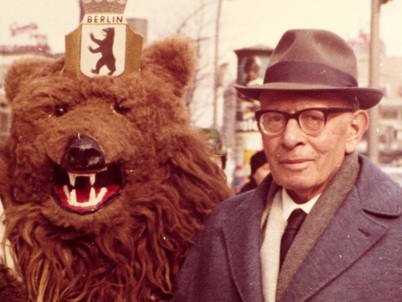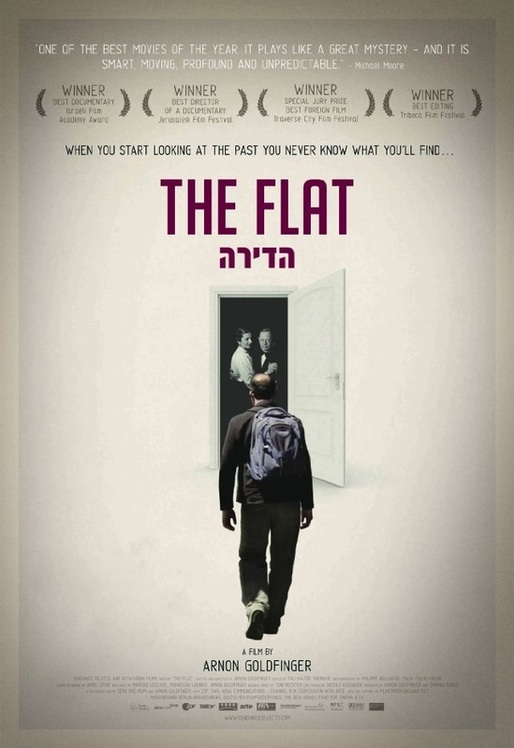
CAST & CREW
Featuring Arnon Goldfinger
Hannah Goldfinger & Edda Milz von Mildenstein
A documentary directed and written
by Arnon Goldfinger
In Hebrew, German & English with English subtitles
Running time: 97 minutes
No MPAA rating.
Reviewed by Kenneth Turan – LA Times
There's something shambling and unassuming about "The Flat," a home-movie quality to much of its footage. But it's not just any home that's being examined, and that makes all the difference.
Israel's top-grossing documentary of last year as well as the winner of that country's best documentary award, "The Flat" succeeds by being wide-ranging as well as particular. It tells an out-of-the-ordinary personal story and examines broad historical issues of societal memory and selective amnesia, of what is hidden between generations and what is revealed.
It all begins with the flat of the title, an apartment in Tel Aviv belonging to Gerda Tuchler, the grandmother of director Arnon Goldfinger. When Tuchler dies at 98, the entire family gathers to decide how to dispose of the possessions of a lifetime, seven decades of which were spent in that one space.
Though she'd lived in Israel all that time after emigrating with her husband, Kurt, from Germany, Gerda Tuchler's heart had stayed in the old country. She'd never really mastered Hebrew, and entering the apartment, filled with German books, artwork and furnishings, was, her grandson says, like visiting Berlin in Tel Aviv.
That family gathering is initially not very compelling, but everything changes with the chance discovery, buried by decades of detritus, of copies of "Der Angriff," or "The Attack," a virulently pro-Nazi newspaper edited by Joseph Goebbels himself and dating from the fall of 1934.
The shock of finding those papers is soon overtaken by a greater one: Under the headline "A Nazi Travels to Palestine," these journals tell the story of a prominent party functionary named Leopold von Mildenstein who visited the Holy Land with his wife in the company of a pair of ardent German Zionists — Kurt and Gerda Tuchler, the filmmaker's grandparents.
Agitated by the information, and by the parallel discovery that his mother, Hannah, neither knew about this history nor seems to care much about it now, filmmaker Goldfinger embarks on an investigation to find out the extent of his grandparents' relationship with the Von Mildensteins and what caused it.
The first part of that answer turns out to be easy to come by. For a brief moment in time during the 1930s, the Nazis and German Zionists shared what one historian calls "temporary mutual interest": They both wanted to get German Jews out of Germany and into Palestine.
But then Goldfinger realizes something more perplexing: These two couples remained friends for quite some time, not only after the Palestine trip but even after World War II ended, when visits to Germany by his grandparents were not uncommon despite the realization of what the Nazis had done.
Helped by an old envelope found in Gerda's papers, the filmmaker contacts the Von Mildensteins' daughter, Edda, who lives in Wuppertal (the home, though Goldfinger doesn't seem to know this, of Pina Bausch's exceptional dance troupe).
At this early point, "The Flat" turns into something of a detective story, as Goldfinger follows up leads and tracks down information to unearth unknown aspects of both his own family and the Von Mildensteins, discoveries so unnerving he is not sure with whom he should share the resulting information.
Some of the themes "The Flat" addresses, like the notion of why one generation asks questions about World War II and the Holocaust that another generation does not, have been addressed in other places and are not helped here by Goldfinger's attitude toward his mother's feelings.
On the other hand, a story this singular raises a number of fascinating issues, potently illustrating humanity's almost infinite ability to compartmentalize unpleasant information when necessary as well as the need for friendship as a reflection of self-image that is powerful enough to survive what would seem to be a suffocating reality. No definitive answers are possible to the questions "The Flat" raises, which makes them all the more provocative.
There's something shambling and unassuming about "The Flat," a home-movie quality to much of its footage. But it's not just any home that's being examined, and that makes all the difference.
Israel's top-grossing documentary of last year as well as the winner of that country's best documentary award, "The Flat" succeeds by being wide-ranging as well as particular. It tells an out-of-the-ordinary personal story and examines broad historical issues of societal memory and selective amnesia, of what is hidden between generations and what is revealed.
It all begins with the flat of the title, an apartment in Tel Aviv belonging to Gerda Tuchler, the grandmother of director Arnon Goldfinger. When Tuchler dies at 98, the entire family gathers to decide how to dispose of the possessions of a lifetime, seven decades of which were spent in that one space.
Though she'd lived in Israel all that time after emigrating with her husband, Kurt, from Germany, Gerda Tuchler's heart had stayed in the old country. She'd never really mastered Hebrew, and entering the apartment, filled with German books, artwork and furnishings, was, her grandson says, like visiting Berlin in Tel Aviv.
That family gathering is initially not very compelling, but everything changes with the chance discovery, buried by decades of detritus, of copies of "Der Angriff," or "The Attack," a virulently pro-Nazi newspaper edited by Joseph Goebbels himself and dating from the fall of 1934.
The shock of finding those papers is soon overtaken by a greater one: Under the headline "A Nazi Travels to Palestine," these journals tell the story of a prominent party functionary named Leopold von Mildenstein who visited the Holy Land with his wife in the company of a pair of ardent German Zionists — Kurt and Gerda Tuchler, the filmmaker's grandparents.
Agitated by the information, and by the parallel discovery that his mother, Hannah, neither knew about this history nor seems to care much about it now, filmmaker Goldfinger embarks on an investigation to find out the extent of his grandparents' relationship with the Von Mildensteins and what caused it.
The first part of that answer turns out to be easy to come by. For a brief moment in time during the 1930s, the Nazis and German Zionists shared what one historian calls "temporary mutual interest": They both wanted to get German Jews out of Germany and into Palestine.
But then Goldfinger realizes something more perplexing: These two couples remained friends for quite some time, not only after the Palestine trip but even after World War II ended, when visits to Germany by his grandparents were not uncommon despite the realization of what the Nazis had done.
Helped by an old envelope found in Gerda's papers, the filmmaker contacts the Von Mildensteins' daughter, Edda, who lives in Wuppertal (the home, though Goldfinger doesn't seem to know this, of Pina Bausch's exceptional dance troupe).
At this early point, "The Flat" turns into something of a detective story, as Goldfinger follows up leads and tracks down information to unearth unknown aspects of both his own family and the Von Mildensteins, discoveries so unnerving he is not sure with whom he should share the resulting information.
Some of the themes "The Flat" addresses, like the notion of why one generation asks questions about World War II and the Holocaust that another generation does not, have been addressed in other places and are not helped here by Goldfinger's attitude toward his mother's feelings.
On the other hand, a story this singular raises a number of fascinating issues, potently illustrating humanity's almost infinite ability to compartmentalize unpleasant information when necessary as well as the need for friendship as a reflection of self-image that is powerful enough to survive what would seem to be a suffocating reality. No definitive answers are possible to the questions "The Flat" raises, which makes them all the more provocative.






